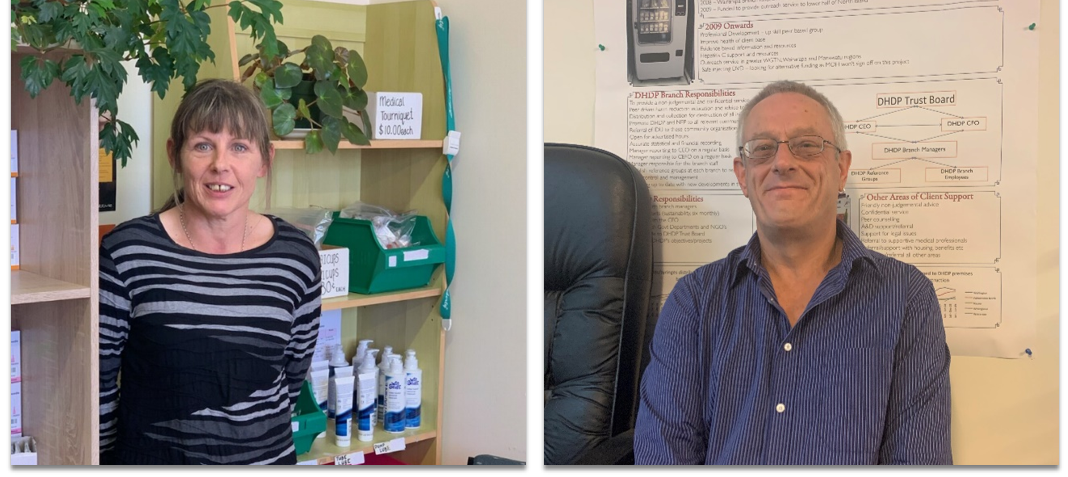The marginalized and isolated community of drug users face stigma and discrimination every day. For many people, the stigma of criminality is a part of everyday life.
New Zealand’s Needle Exchange Programme seeks to support this community by preventing blood borne viruses such as Hepatitis C, and pushing ‘harm reduction’. It allows people anonymity and support from peer support staff who do not pass judgement.
According to Carl Greenwood, General Manager of Drugs Health and Development Project, “We don’t condemn or condone drug abuse. We say it happens, and we just want it to happen as safely as possible.”
Industry training organisation for the health and wellbeing sector, Careerforce, has taken on the challenge of supporting workers in this specific sector, via apprenticeships.

Left: Apprentice, Caroline, Right: Carl Greenwood, General Manager of Drugs Health and Development Project
“For many years there was a lack of training, because the work we do is so unique,” says Carl. “Fitting what we do into actual course work can be really difficult. Some programmes require that you show how you’ve helped individuals over time, and it’s just not what we do, we don’t work with people at that level. It’s a confidential and anonymous service, and we don’t even know people’s names.”
Careerforce Apprenticeship Advisor, Danny Fearon adds, “This is a unique case of sometimes vulnerable people supporting vulnerable people. With the Needle Exchange Programme, we are taking on a more in-depth role in the learning. We’re working closely with managers and team leaders like Carl to align the Apprenticeship programme to the unique nature of this work. For example, areas such as health and safety, risk management, strategies, systems and processes, all have greater focus within the learning structure.”
The Wellington based Drugs Health and Development Project is one component of the nationwide NZ Needle Exchange Programme. In its ‘hub and spoke model’, with each region having its own headquarters to service the regional variations. An overarching body handles the products, resources and pricing which are standard across the country.
Carl has managed the Wellington office for eight years. “My life experience has driven me to this role. Living with HIV, since being diagnosed in 1989, gave me an insight into the stigma and difficulties for people who live with HIV. My path involved drug use, abuse and hedonistic behaviour, after being told I had only 10 years to live.”
This lived experience, together with a background as a gay men’s health promoter for the NZ Aids Foundation, armed him with an appreciation of stigma and discrimination.
“I understand drug addiction from a health point of view. I’ve had discrimination thrown at me for bruised veins, and tell tail signs of use. I’ve had scorn thrown at me,” says Carl.
“Most of the people who work here have had some form of lived experience and some are on the methadone programme. The work can be quite emotional, and you hear some sad stories. My role is understanding the workforce, empowering them to believe that they have something to offer and getting them to be productive.
“When people come in, we give them the opportunity to talk about what they are doing in a very non-judgemental way. We offer lots of advice and support. We’ll talk them through ‘wheel filtering’, or they may have run out of veins to use. These can be quite technical conversations which they should be having with their doctor. It’s better that they ask us, where there are people with some knowledge who can share harm reduction advice and avoid doing all sorts of damage.”
Much of the workforce struggled in school and/or it’s been a long time since they were engaged in education. According to Carl, Careerforce had been really good accepting that some people struggle with literacy and have been helping as much as they can with that. One person has set themselves up with a speech to text function.
“I think it is good that the apprentices do have the confidence and the ability. For me the best thing would be for someone to leave and move into a full-time role doing such and such and to say, this is where it all started. That would be the ultimate pat on the back, I think.”
Caroline at the Needle Exchange Programme is completing a Health and Wellbeing Apprenticeship (Social and Community Services) with support from Careerforce. The apprenticeship is fully on-the-job learning, based around her everyday workflows and responsibilities. Caroline describes the course “Challenging, enjoyable, learning lots which is relevant to my workplace.”
Side note: “In New Zealand we have done really well at keeping HIV out of this community, but Hepatitis C is a totally different ball game. The World Health Organisation wants to eliminate Hep C by 2030 and I think that’s an achievable goal. We’re hoping for more resources and funding to see the back of HepC would be very exciting.”
Visit Careerforce for more information about Careerforce Apprenticeships for the Health and Wellbeing sector, and the Government’s Apprenticeship Boost funding programme.

